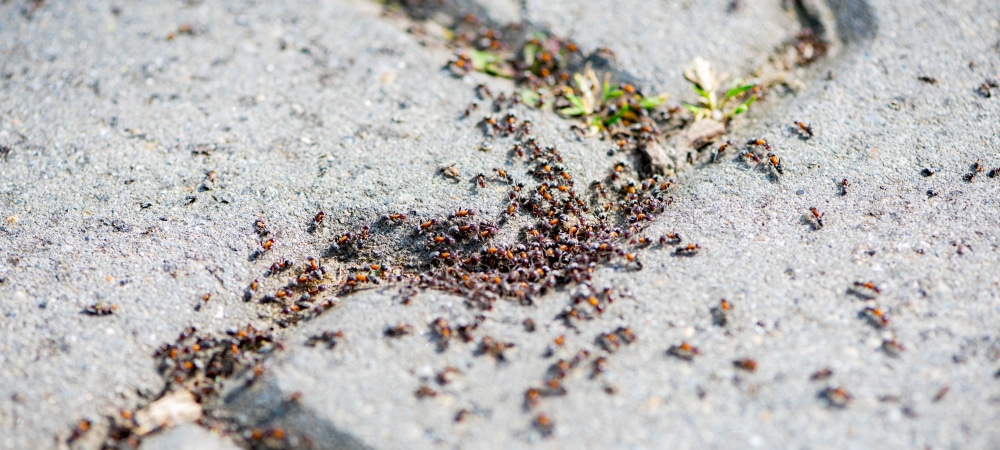
What are Pavement Ants?: What You Need to Know About Tetramorium Immigrans
May 19, 2023
By Daniel Baldwin, BCE, CCFS, CP-FS
If you find ants in your kitchen or bathroom, there’s a good chance they’re pavement ants. While they can become a nuisance after entering your home, it is possible to control them. In this post, we’ll tell you what you need to know about pavement ants and what you can do if you have an infestation.
What are pavement ants?
Pavement ants (tetramorium caespitum) are a species of ant that can be found in all 50 states, although they are most abundant in New England, the Midwest, the Mid-Atlantic, and the Pacific Northwest regions, where they account for many of the ant infestation problems in homes.
Pavement ants often establish their homes outdoors under sidewalks, concrete foundation slabs, and rocks. You can often identify the location of nests by looking for sand or dirt piles called pavement ant mounds. The ants build these mounds as they clear debris from the ground to build their nests.

What do pavement ants look like?
Pavement ants are reddish-brown to black, with legs and antennae that are typically paler than their bodies. The antennae consist of 12 segments and have a three-segmented club at the end. However, seeing these details with the naked eye is difficult because the worker ants are usually only around 3/16 inches long.
What attracts pavement ants?
As social insects, pavement ants live in colonies that can be home to thousands of workers. They leave the pavement nest to go out searching for food. If they find a food source, they release chemicals called pheromones to attract other workers. In short order, worker ants can cover an area and cooperate to break down the food and carry it back to the nest.
Do pavement ants have wings?
The worker pavement ants you’ll most likely spot in your home don’t have wings. However, the reproductive members of the colony do have wings. Known as swarmers, these pavement ants are about twice the size of workers and usually burrow into the soil to lay eggs.
What do pavement ants eat?
Pavement ants have a diverse diet and prefer foods rich in sugar and protein. They may feed on dead insects like flies and are known to consume plant nectar, sugar, fruits, seeds, and syrups.
Do pavement ants bite?
Pavement ants don’t bite, but they do have stingers. The insects aren’t aggressive and usually try to flee rather than sting unless threatened.
Pavement ants vs. pharaoh ants
Pharaoh ants are another common pest found in many parts of the U.S., and it’s possible to mistake them for pavement ants. Here’s how to tell the two apart:
- Location: Pavement ants are common in residential areas, while pharaoh ants are more likely to impact places like grocery stores, hospitals, and hotels, as these locations tend to provide more hiding places.
- Nests: With pavement ants, you’re likely to find mounds of dirt outside of your home because the insects nest underground. Pharaoh ants often build their nests inside walls, within appliances, and other indoor areas.
- Size: Pharaoh ants are around half the size of pavement ants.
- Color: Pavement ants tend to be reddish-brown, while pharaoh ants may be light brown, yellow, or red.
- Markings: The tip of a pharaoh ant’s abdomen typically appears slightly darker than the rest of it, while pavement ants are lighter along the legs and antennae.

How to get rid of pavement ants in a house
- Give the space a deep cleaning: Wipe down surfaces, vacuum, and mop to eliminate food waste and debris that attracts ants.
- Fix plumbing problems: Leaky fixtures in the kitchen or bathroom can provide pavement ants with a source of fresh drinking water.
- Repair structural issues: Replace caulking around windows and doors and repair any cracks in your home’s exterior that could allow ants to enter.
- Clean your gutters: Ensure water drains away from your home to avoid creating damp areas for pavement ants to nest.
- Elevate wood piles: If you store wood outside, use a holder to keep the logs off the ground. Cover the wood pile with an insect-proof cover to prevent access and check any logs before you bring them in for your fireplace.
- Seal concrete and stone: Protect outdoor masonry and concrete with waterproof sealants that reduce the risk of cracking due to moisture. This can help keep surfaces from cracking and prevent hiding places for pavement ants.
- Call the pros: A professional pest control company can fully treat areas of your home to eliminate pavement ants.
Pest control services
If you’re concerned about pavement ants in the house, contact Hawx Pest Control. We have the knowledge and expertise to address most kinds of pest infestations. We use state-of-the-art technologies and the latest products at our disposal. Our experts can also identify potential entry points that you can repair and give helpful pest prevention tips to help your home remain ant-free in the future. Call us today for a free estimate.
Categories
RELATED POSTS



